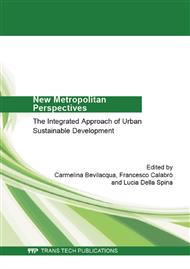[1]
I. Sagan, H. Halkier: Regionalism Contested. Institution, Society and Governance. Ashgate, Aldershot (2005), pp.163-176.
Google Scholar
[2]
Dijkstra, L, H. Poelman: Metropolitan regions in the EU, European Union Regional Policy, Regional Focus n. 1/(2011).
Google Scholar
[3]
L. Gagliardi, M. Percoco: Understanding European urban development: A review of selected issues, Università Bocconi, Milano (2012).
Google Scholar
[4]
A. Caperna, A. Giangrande, P. Mirabelli, E. Mortola: Partecipazione e ICT, Gangemi Editore, Roma (2013).
Google Scholar
[5]
G. Cassalia, C. Ventura: Festivals, tourism and rural development: A key for cultural heritage preservation, in: Active Countryside Tourism Conference proceedings, ICRETH and RSA, Leeds (2013).
Google Scholar
[6]
C. Dümcke, M. Gnedovsky: The Social and Economic Value of Cultural Heritage: literature review, EENC Paper (2013).
Google Scholar
[7]
F. Calabrò, L. Della Spina: The cultural and environmental resources for sustainable development of rural areas in economically disadvantaged contexts. Economic-appraisals issues of a model of management for the valorisation of public assets, in: 3rd International Conference on Energy, Environment and Sustainable Development (ICEESD 2013), Advanced Materials Research Vols. 869-870 (2014).
DOI: 10.4028/www.scientific.net/amr.869-870.43
Google Scholar
[8]
A. Everitt: The governance of culture: approaches to integrated cultural planning and policies Council of Europe Pub., Strasbourg (1999).
Google Scholar
[9]
C. Gray: Joining Up or Tagging On?: The Arts, Cultural Planning and the View From Below, in: Public Policy and Administration, Vol. 19, No. 2 (2004), pp.38-49.
DOI: 10.1177/095207670401900206
Google Scholar
[10]
F. Bianchini, M. Parkinson: Cultural Policy and Urban Regeneration: The West European Experience, Manchester University Press, Manchester (1993).
DOI: 10.1080/00420989420080461
Google Scholar
[11]
L. Ghilardi: Culture at the Centre, National Cultural Planning Steering Group, Glasgow (2005).
Google Scholar
[12]
R. Lloyd, T. Nichols Clark: The city as an entertainment machine, in: Critical perspectives on urban redevelopment, Research in urban sociology, edited by Kevin Fox Gotham, Vol. 6, JAI Press/Elsevier, Oxford (2001), p.357–78.
DOI: 10.1016/s1047-0042(01)80014-3
Google Scholar
[13]
Commission of the European Communities, Fifth Report on Economic, Social and Territorial Cohesion. Investing in Europe's future, November (2010).
Google Scholar
[14]
A. Magnaghi: Il progetto locale, Bollati Boringhieri, Torino (2000).
Google Scholar
[15]
Italian Bill dated December 21, 2013 n. 1212.
Google Scholar
[16]
G. Cassalia: Il Festival, la comunità locale e il turismo culturale, in: LaborEst, pagine di estimo e valutazione di piani, programmi e progetti, Laruffa editore, Reggio Calabria, 4/2009 (2009), pp.57-61.
Google Scholar


